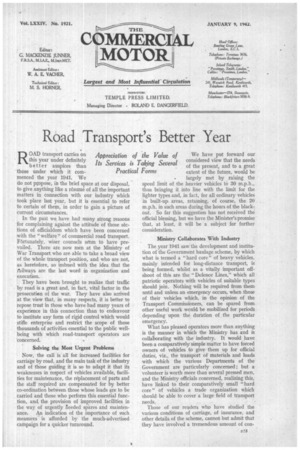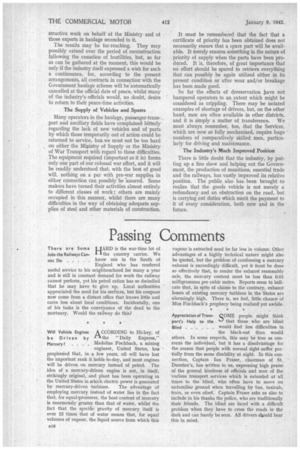Road Transport's Better Year
Page 19

Page 20

If you've noticed an error in this article please click here to report it so we can fix it.
ROAD transport carries on this year under definitely better auspices than those under which it commenced the year 1941. We do not propose, in the brief space at our disposal, to give anything like a résumé of all the important matters in connection with our industry which took place last year, but it is essential to refer to certain of them, in order to gain a picture of current circumstances.
In the past we have had many strong reasons for complaining against the attitude of those sections of officialdom which have been concerned with the "welfare" of commercial road transport. Rirtunately, wiser counsels semi to have prevailed. There are now men at the Ministry of War Transport who are able to take a broad view of the whole transport position, and who are not, as heretofore, so imbued with the idea that the Milways are the last word in organization and execution.
They have been brought to realize that traffic by road is a great and, in fact, vital factor in the prosecution of the war. They have also arrived at the view that, in many respects, it is better to repose trust in those who have had many years of experience in this connection than to endeavour to institute any form of rigid control which would stifle enterprise and restrict the scope of those thousands of activities essential to the public wellbeing with which road-transport operators are concerned. .
Solving the Most Urgent Problems Now, the call is all for increased facilities for carriage by road, and the main task of the industry and of those guiding it is so to adapt it that its weaknesses in respect of vehicles available, facilities for maintenance, the replacement of parts and the staff required are compensated for by better co-ordination between those whose loads are to be carried and those who perform this essential function, and, the provision of improved facilities in the way of urgently heeded spares and maintenance. An indication of the importance of such measures is afforded by the much-advertised campaign for a quicker turnround. We have put forward our considered view that the needs of the present, and to a great extent of the future, would he largely met by raising the speed limit of the heavier vehicles to 30 m.p.h., thus bringing it into line with the limit for the lighter types and, in fact, for all ordinary vehicles in built-up, areas, retaining, of course, the 20 m.p.h. in such areas during the hours of the blackout. So far this suggestion has not received the official blessing, but we have the Minister's promise that at least, it will be a subject for further consideration.
Ministry Collaborates With Industry The year 1941 saw the development and institution of the Government haulage scheme, by which what is termed a "hard core" of heavy vehicles, mainly intended for long-distance transport, is being formed, whilst as a vitally important offshoot of this are the "Defence Lines," which all patriotic operators with vehicles of suitable types should join. Nothing will be required from them until and unless an emergency occurs, when those of their vehicles which, in the opinion of the Transport Commissioners, can be spared from other useful work would be mobilized for periods depending upon the duration of the particular emergency.
What has pleased operators more than anything is the manner in which the Ministry has and is collaborating with the industry. It would have been a comparatively simple matter to have forced owners of vehicles to give them up for official duties, viz., the transport of materials and loads with which the various Departments of the Government are particularly concerned ; but a volunteer is worth more than several pressed men, and the Ministry officials concerned, realizing this, have linked to their comparatively small "hard core" of vehicles a trade organization which should be able to cover a large field of transport needs.
Those of our readers who have studied the various conditions of carriage, of insurance, and other details of the scheme, cannot but admit that they have involved a tremendous amount of con structive work on behalf of the Ministry and ot those experts in haulage seconded to it.
The results may be far-reaching. They may possibly extend over the period of reconstruction following the cessation of hostilities, but, so far as can be gathered at the moment, this would be only if the industry itself expressed a wish for such a continuance, for, according to the present arrangements, all contracts in connection with the Government haulage scheme will be automatically cancelled at the official date of peace, whilst many of the industry's officials would, no doubt, desire to return to their peace-time activities.
The Supply of Vehicles and Spares Many operators in the haulage, passenger-trans-. port and ancillary fields have complained bitterly regarding the lack of new vehicles and of parts by which those temporarily out of action could be returned to service, but. we must not be too hard on either the Ministry of Supply or the Ministry of War Transport with regard to these difficulties. The equipment required (important as it is) forms only one part of our colossal war effort, and it will be readily understood that, with the best of good will, nothing on a par with pre-war supplies in either connection can possibly be 'assured. Some makers have turned their activities almost entirely to different classes of work ; others are mainly occupied in this manner, whilst there are many difficulties in the way of obtaining adequate supplies of steel and other materials of construction. It must be remembered that the fact that a certificate of priority has been obtained does not necessarily ensure that a spare part will be available. It merely ensures something in the nature of priority of supply when the parts have been produced. It is, therefore, of great importance that no effort should be spared to retrieve everything that can possibly be again utilized either in its present condition or after wear and/or breakage has been macle good.
So far the effects of dereservation nave not hampered operators to an extent which might be considered as crippling. There may be isolated examples of shortage of drivers, but, on the other hand, men are often available in other districts, and it is simply a matter of transference. We must always remember, too, that the Services, which are now so fully mechanized, require huge numbers of comparatively skilled men, particularly for driving and maintenance.
The Industry's Much Improved Position There is little doubt that the industry, by putting up a fine show and helping out the Government, the production of munitions, essential trade and the railways, has vastly improved its relative position. The public also has been brought 'to realize that the goods vehicle is not merely a redundancy and an obstruction on the road, but is carrying out duties which merit the payment to it of every consideration, both now and in the future.
























































